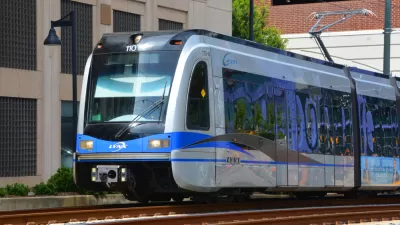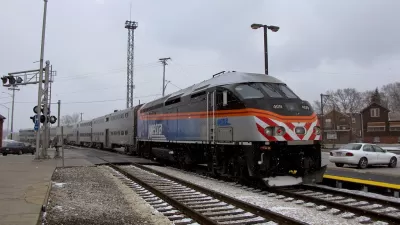Seemingly as hard to find as the mythic Sasquatch or a Unicorn, we've searched high and low for a conservative who supports transit (or at least who will say so in public) and have found one, in the region around Charlotte, North Carolina.
William S. Lind, director of The American Conservative Center for Public Transportation, has authored an editorial for The Herald Weekly in response to a speech given last week by Randal O'Toole, a senior fellow at the Cato Institute, condemning the proposed Charlotte area commuter rail (Red Line) as outdated and overly expensive. In the piece, Lind expresses his support for the Red Line, argues for why rail serves conservative goals, and finds figures to support his contention that he is not alone amongst conservatives to support commuter rail.
Lind notes that, "Rail transit of all kinds, including commuter trains, serves other conservative goals. It promotes economic development and raises property values. Many of Chicago's Metra stations have become densely-developed hubs that bring lots of real-estate tax revenues into town coffers. Rail transit offers suburbanites a way to get around when gas prices soar or events in the Middle East make gas unavailable at any price, as they did in 1973 and 1979."
Distinguishing between conservatives and libertarians, Lind contends that, "While conservatives support some transit projects and oppose others, depending on the project's merits, libertarians oppose all rail transit all the time. They also generally oppose all forms of planning for economic development and growth. They say things that are blatantly untrue such as 'Highways pay for themselves while trains are subsidized.'"
Rep. Boehner, are you listening?
FULL STORY: A conservative who’s for the Red Line

Planetizen Federal Action Tracker
A weekly monitor of how Trump’s orders and actions are impacting planners and planning in America.

Congressman Proposes Bill to Rename DC Metro “Trump Train”
The Make Autorail Great Again Act would withhold federal funding to the system until the Washington Metropolitan Area Transit Authority (WMATA), rebrands as the Washington Metropolitan Authority for Greater Access (WMAGA).

The Simple Legislative Tool Transforming Vacant Downtowns
In California, Michigan and Georgia, an easy win is bringing dollars — and delight — back to city centers.

The States Losing Rural Delivery Rooms at an Alarming Pace
In some states, as few as 9% of rural hospitals still deliver babies. As a result, rising pre-term births, no adequate pre-term care and "harrowing" close calls are a growing reality.

The Small South Asian Republic Going all in on EVs
Thanks to one simple policy change less than five years ago, 65% of new cars in this Himalayan country are now electric.

DC Backpedals on Bike Lane Protection, Swaps Barriers for Paint
Citing aesthetic concerns, the city is removing the concrete barriers and flexposts that once separated Arizona Avenue cyclists from motor vehicles.
Urban Design for Planners 1: Software Tools
This six-course series explores essential urban design concepts using open source software and equips planners with the tools they need to participate fully in the urban design process.
Planning for Universal Design
Learn the tools for implementing Universal Design in planning regulations.
Smith Gee Studio
City of Charlotte
City of Camden Redevelopment Agency
City of Astoria
Transportation Research & Education Center (TREC) at Portland State University
US High Speed Rail Association
City of Camden Redevelopment Agency
Municipality of Princeton (NJ)





























